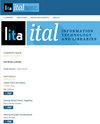在图书馆开展开源优先实践
IF 1.3
4区 管理学
Q3 COMPUTER SCIENCE, INFORMATION SYSTEMS
引用次数: 0
摘要
就实用性和技术质量而言,开源软件解决方案已成为许多图书馆的共同选择。由于采用开源软件的障碍已经减少,而且 FOLIO 等系统似乎已经准备好改变 LIS 技术的面貌,因此值得研究如何使用开源软件来支持图书馆学的规范性核心价值,并勾勒出一个对读者和图书馆都有利的技术关键参与战略。这一战略需要在多个层面对开放源代码进行进一步的编纂、制度化和研究。本文章由计算机程序翻译,如有差异,请以英文原文为准。
Towards an Open Source-first Praxis in Libraries
In terms of utility and technical quality, open source software solutions have become a common option for many libraries. As barriers to adoption have been reduced and systems such as FOLIO appear poised to change the landscape of LIS technology, it is worth examining how the use of open source can support the normative core values of librarianship, and to outline a strategy for critical engagement with the technology that is beneficial to patrons and libraries. That strategy will require further codification, institutionalization and investigation of open source at many levels.
求助全文
通过发布文献求助,成功后即可免费获取论文全文。
去求助
来源期刊

Information Technology and Libraries
管理科学-计算机:信息系统
CiteScore
2.90
自引率
5.60%
发文量
25
审稿时长
1 months
期刊介绍:
Information Technology and Libraries publishes original material related to all aspects of information technology in all types of libraries. Topic areas include, but are not limited to, library automation, digital libraries, metadata, identity management, distributed systems and networks, computer security, intellectual property rights, technical standards, geographic information systems, desktop applications, information discovery tools, web-scale library services, cloud computing, digital preservation, data curation, virtualization, search-engine optimization, emerging technologies, social networking, open data, the semantic web, mobile services and applications, usability, universal access to technology, library consortia, vendor relations, and digital humanities.
 求助内容:
求助内容: 应助结果提醒方式:
应助结果提醒方式:


